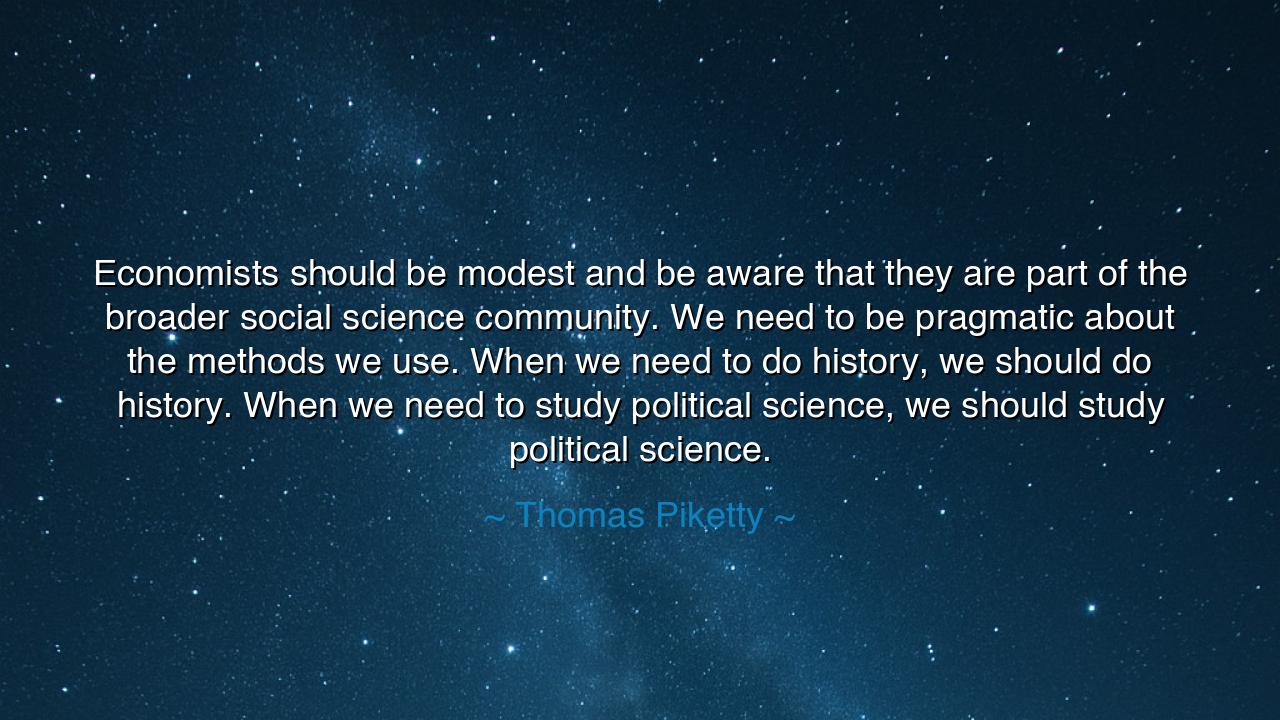
Economists should be modest and be aware that they are part of
Economists should be modest and be aware that they are part of the broader social science community. We need to be pragmatic about the methods we use. When we need to do history, we should do history. When we need to study political science, we should study political science.






“Economists should be modest and be aware that they are part of the broader social science community. We need to be pragmatic about the methods we use. When we need to do history, we should do history. When we need to study political science, we should study political science.” — Thomas Piketty
Listen, O seekers of knowledge, to the words of Thomas Piketty, the sage of modern economics, who reminds the scholars of his age to temper pride with modesty, and ambition with wisdom. In this saying lies not a rebuke, but a call to humility—a reminder that no discipline stands alone, and that truth cannot be captured by numbers alone. The economist, he says, must not be a priest of abstraction, worshipping at the altar of equations, but a servant of understanding. For the wealth of nations cannot be measured only in currency, nor their destiny told only in graphs and charts. Humanity is not a formula—it is a living story.
Piketty spoke these words as one who had seen the danger of arrogance in his own craft. For in the great crises of the modern world—inequality, instability, the decline of trust—many turned to economists for answers, and found instead the cold comfort of theory. But Piketty, who walked among both data and history, understood that the roots of these problems ran deep, entangled in politics, culture, and memory. He learned from the chronicles of empire, the revolutions of peoples, and the shifting balance of power that wealth is not only earned—it is shaped, contested, and remembered. Thus, he counsels his fellow scholars: When the path to wisdom crosses the borders of other fields, walk there gladly.
For what is economics, if not a branch of the tree of human understanding? The ancients knew this truth well. Aristotle, in his Politics, wrote not only of exchange and labor, but of virtue, justice, and the common good. Ibn Khaldun, the great Arab historian, described the rise and fall of civilizations through both their wealth and their spirit. And Adam Smith, the so-called father of economics, was first a moral philosopher; before he wrote of markets, he wrote of sympathy, of how human beings understand one another’s feelings. Each of these men saw that no study of wealth or labor could be divorced from history, ethics, and power. Their wisdom was whole; their learning, united.
Yet, in later centuries, knowledge became divided. The sciences split apart like broken continents—each proud of its territory, each speaking a language the others could not hear. The economist built models, the historian kept chronicles, the political thinker studied law and governance—and seldom did they meet at the same table. But Piketty calls for reunion. He reminds us that all disciplines are but different windows looking upon the same vast landscape of human life. To study one without the others is to look upon the horizon through a keyhole. True understanding requires breadth as well as depth, and wisdom demands the humility to learn from every corner of the mind’s kingdom.
Consider the story of the Great Depression. Economists at first sought its cause in the movements of markets alone—in interest rates, trade balances, and production. But it was the insight of others—historians, sociologists, and political thinkers—that revealed the full picture: the desperation of families, the fragility of democracy, the rise of new ideologies that would set the world aflame. Only when all these voices were heard did the world begin to rebuild not only its economies, but its societies. Thus, Piketty’s call is not academic—it is urgent. To heal the world’s wounds, one must first see the whole of the body, not merely its parts.
The lesson, then, is this: knowledge must serve life, not the pride of those who wield it. Be not a scholar who seeks mastery over others, but one who seeks harmony among truths. When the problem before you demands history, do not shrink from the past; when it demands politics, do not fear the struggle of power. Let your mind be supple, your learning broad, your heart attuned to the rhythms of humanity. For wisdom is not the possession of one field, but the dialogue of many.
So remember, children of inquiry, that to be wise is not to know everything, but to know how all things are connected. Whether you are an economist, an artist, a scientist, or a philosopher, let humility be your companion and curiosity your guide. The mind that opens to other minds becomes a bridge; the one that closes upon itself becomes a prison. Follow Piketty’s teaching: be pragmatic, be interdisciplinary, be human. For the world is not made of subjects—but of stories, woven together by the same eternal thread.






AAdministratorAdministrator
Welcome, honored guests. Please leave a comment, we will respond soon